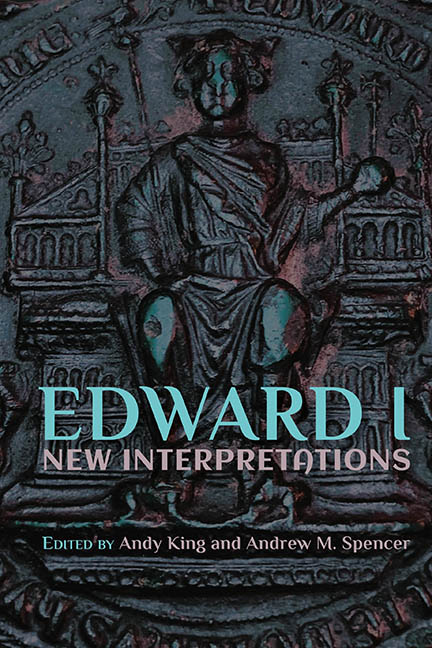Book contents
- Frontmatter
- Contents
- List of Contributors
- Acknowledgments
- Abbreviations
- Genealogy of Edward I
- Introduction
- 1 The Lord Edward and the Administration of Justice across his Apanage, 1254–72
- 2 A Tale of Two Ministers: Robert Burnell, Walter Langton and the Government of Edward I
- 3 Law and Order in the Reign of Edward I: Some New Thoughts
- 4 Magnates, Ritual and Commensality at Royal Assemblies: Bogo de Clare and Edward I’s Easter Parliament, 1285
- 5 Royal Daughters and Diplomacy at the Court of Edward I
- 6 Hearts and Bodies: Edward I and the Scottish Magnates, 1296–1307
- 7 Edward I and the Blessed Virgin Mary
- 8 Letters and Political Discourse under Edward I
- 9 Crisis? What Crisis? 1297 and the Civil War that Never Was
- Index
4 - Magnates, Ritual and Commensality at Royal Assemblies: Bogo de Clare and Edward I’s Easter Parliament, 1285
Published online by Cambridge University Press: 21 March 2020
- Frontmatter
- Contents
- List of Contributors
- Acknowledgments
- Abbreviations
- Genealogy of Edward I
- Introduction
- 1 The Lord Edward and the Administration of Justice across his Apanage, 1254–72
- 2 A Tale of Two Ministers: Robert Burnell, Walter Langton and the Government of Edward I
- 3 Law and Order in the Reign of Edward I: Some New Thoughts
- 4 Magnates, Ritual and Commensality at Royal Assemblies: Bogo de Clare and Edward I’s Easter Parliament, 1285
- 5 Royal Daughters and Diplomacy at the Court of Edward I
- 6 Hearts and Bodies: Edward I and the Scottish Magnates, 1296–1307
- 7 Edward I and the Blessed Virgin Mary
- 8 Letters and Political Discourse under Edward I
- 9 Crisis? What Crisis? 1297 and the Civil War that Never Was
- Index
Summary
IN an influential article on the challenges of studying medieval ritual, Timothy Reuter reminded historians that ‘in the brief accounts of ritual and symbolic behaviour’ that we find in chronicles we ‘have only skeletons or abstractions of complete rituals, and we can often not be sure that we are being told everything’. The medieval historian's position can be compared to that of an art historian who only has access to ‘summary sketches and card indexes of iconography … all the originals having been destroyed by time’. It is certainly the case that chroniclers do not tell us everything. Almost invariably, the chronicler's gaze was drawn to the actions of the anointed monarch or the leading ecclesiastics at the heart of the ritual. The actions of the magnates, courtiers and commoners gathered to attend ceremonies remain shrouded in darkness. For much of the earlier Middle Ages, on the one hand, the chroniclers’ reports provide almost our only access to medieval ritual and attempts at exploring the aspects of ceremonies that did not attract their attention are beset with methodological difficulties. Historians of England in the central and latter Middle Ages, on the other hand, are in the rare position of being able to contrast and combine narrative sources with other sources of information, most importantly the voluminous documentary records. The gravitational pull of the royal archives has, however, often proved as irresistible to modern scholars as the sacrosanct majesty of the king was to their medieval forebears. Thus the recent explosion of studies of ritual in medieval England has revealed a wealth of detail about the importance of the saints, pilgrimages and relics, feasts, gifts and alms, monumental buildings and ceremony to the kings of England. This work has revealed that, contrary to older assumptions, the English kings did not lag behind their continental counterparts in utilising the sacred and numinous to underpin kingship. Nor does the increasing development of royal bureaucracy appear to have lessened the importance placed on ceremony. As Reuter pointed out in another article, the reverse might indeed be the case: the more states intervene in the lives of their subjects the greater their need for legitimation, and thus for the communication and demonstration of this legitimacy, which throughout the Middle Ages meant public spectacle.
- Type
- Chapter
- Information
- Edward I: New Interpretations , pp. 66 - 83Publisher: Boydell & BrewerPrint publication year: 2020



